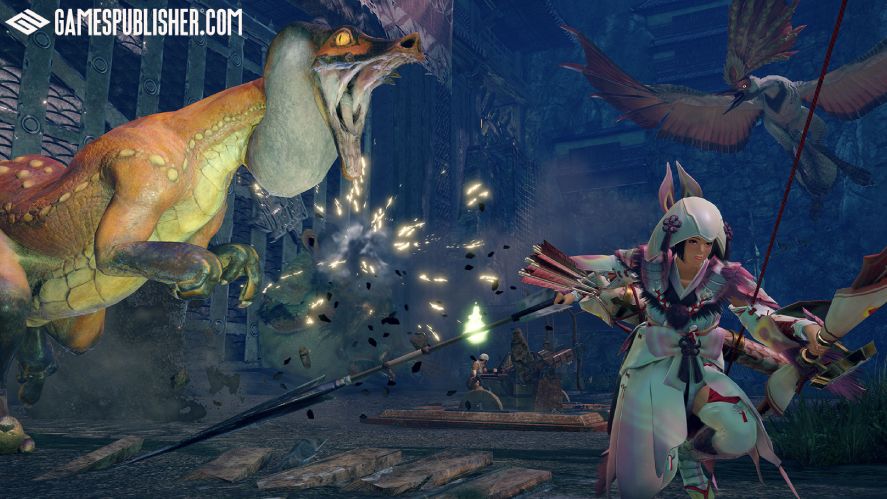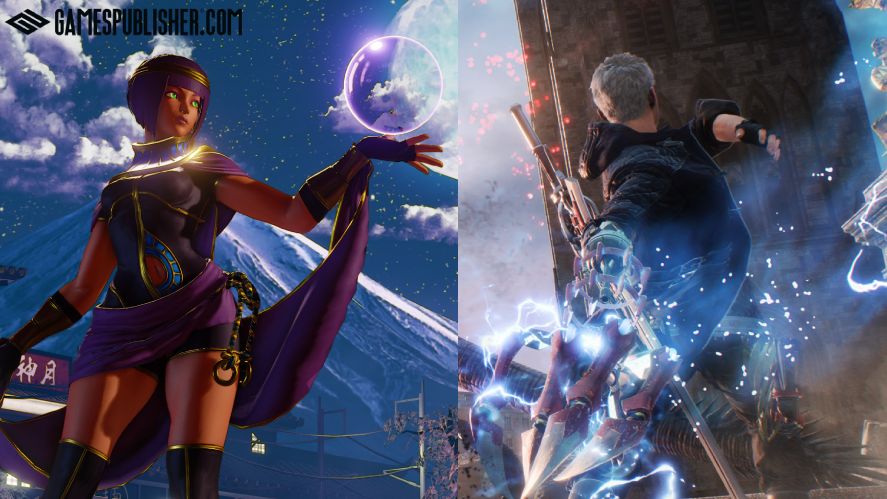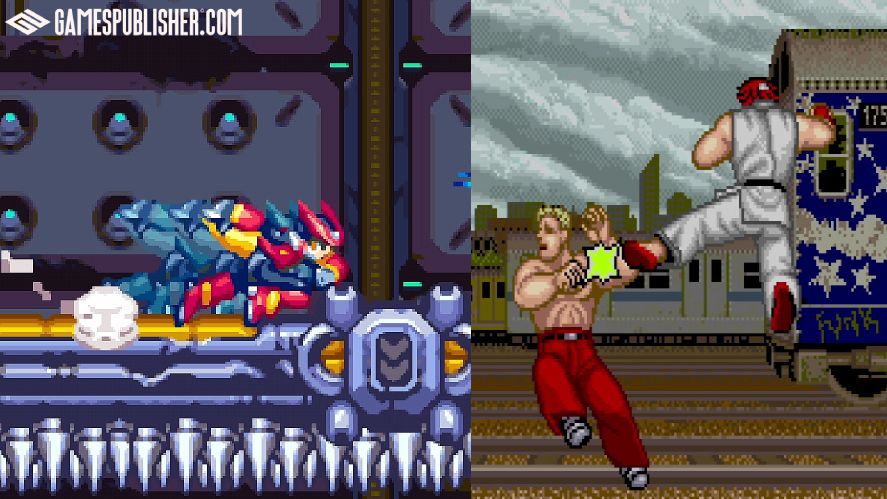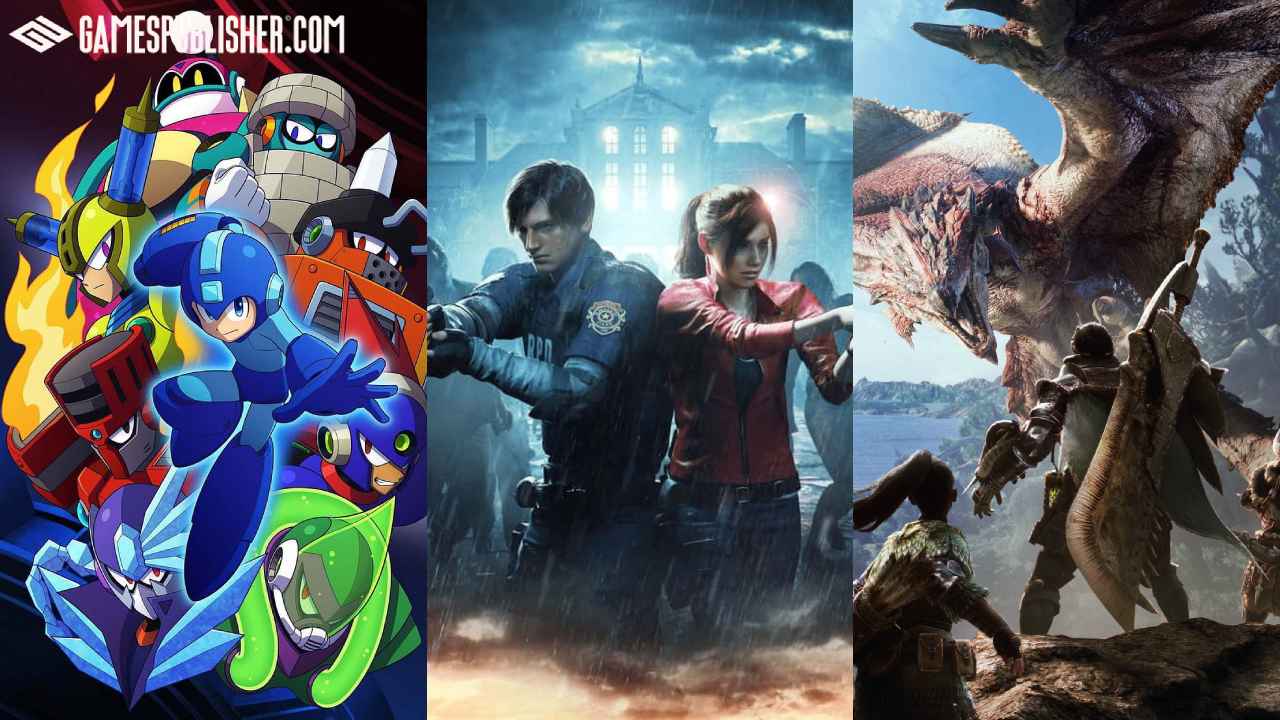Welcome to Gamespublisher.com, your hub for gaming goodness.
Capcom has been a titan among video game publishers for ages. Their Capcom games list is a mix of arcade games and modern epics, which keep players hooked with heart-pounding thrills.
Game developers pore over the list of Capcom games. It’s packed with lessons on crafting game genres that stick.
For video game publishers, Capcom’s knack for keeping IPs fresh across platforms—from old-school cabinets to today’s consoles—shows game publishing done right.
Whether you’re chasing nostalgia or unearthing hidden gems, diving into the Capcom games list sparks game development inspiration!
Capcom Games List Overview
The Capcom games list is a treasure trove of classics and modern hits, built on Capcom’s epic journey in gaming.
Founded in 1979 in Osaka, Japan, Capcom started as a maker of arcade machines. They dropped Capcom arcade games like 1942 that had players glued to cabinets.
By the 1980s, they jumped into home consoles, becoming a global video game publisher with a knack for game development. Today, Capcom has sold over 170 million units of its top franchises as of March 2025.
From Street Fighter’s punchy legacy to Resident Evil’s spooky vibes, Capcom’s game genres—action, fighting, survival horror—set trends that game developers still chase.
Their game publishing smarts, like remakes and cross-platform releases, keep the list of Capcom games thriving. This makes Capcom a heavyweight in gaming worldwide.
Capcom Games List by Franchise
Capcom game list shines brightest through its iconic franchises. Let’s break down four big ones that show why Capcom rules video game genres.
Resident Evil Series
Below is the table that includes all of the games in the Resident Evil franchise with their release dates, genres, platforms, and descriptions.
| Title | Release Date | Genre | Platforms | Description |
|---|---|---|---|---|
| Resident Evil | March 22, 1996 | Survival Horror | PlayStation, Windows, Sega Saturn, Nintendo DS | The game introduces players to the Spencer Mansion, where members of S.T.A.R.S. uncover the horrors unleashed by the Umbrella Corporation. |
| Resident Evil 2 | January 21, 1998 | Survival Horror | PlayStation, Windows, Nintendo 64, Dreamcast, GameCube, Game.com | Set in Raccoon City, newcomers Leon S. Kennedy and Claire Redfield face a viral outbreak, battling through hordes of the undead. |
| Resident Evil 3: Nemesis | September 22, 1999 | Survival Horror | PlayStation, Windows, Dreamcast, GameCube | Jill Valentine attempts to escape Raccoon City while being pursued by the relentless bioweapon, Nemesis. |
| Resident Evil Survivor | January 27, 2000 | FPS | PlayStation, Windows | A first-person shooter where players navigate an island overrun by zombies, uncovering the mysteries of the Umbrella Corporation. |
| Resident Evil CODE: Veronica | February 3, 2000 | Survival Horror | Dreamcast, PlayStation 2, GameCube, PlayStation 3, Xbox 360 | Claire Redfield searches for her brother Chris, leading her to a remote island and deeper into Umbrella’s secrets. |
| Resident Evil Survivor 2 – Code: Veronica | February 8, 2002 | Light Gun Shooter | Arcade, PlayStation 2 | A non-canon title featuring characters from Resident Evil Code: Veronica, offering fast-paced shooting action against various B.O.W.s. |
| Resident Evil Gaiden | March 29, 2002 | Action-adventure | Game Boy Color | Set aboard a luxury cruise ship, players control Leon S. Kennedy and Barry Burton to thwart a new B.O.W. threat. |
| Resident Evil Zero | November 12, 2002 | Survival Horror | GameCube, Wii, Windows, PS3, PS4, Xbox 360, Xbox One | A prequel to the original game, following Rebecca Chambers and Billy Coen as they uncover the origins of the T-virus. |
| Resident Evil: Dead Aim | February 13, 2003 | Light Gun Shooter | PlayStation 2 | Combines third-person exploration with first-person shooting as players combat zombies on a hijacked cruise ship. |
| Resident Evil Outbreak | September 9, 2004 | Survival Horror | PlayStation 2 | Features online multiplayer where players choose from eight characters to survive various scenarios during the Raccoon City outbreak. |
| Resident Evil Outbreak: File 2 | September 9, 2004 | Survival Horror | PlayStation 2 | Continues the online cooperative gameplay with new scenarios and challenges in the zombie-infested Raccoon City. |
| Resident Evil 4 | January 11, 2005 | Action Horror | GameCube, PS2, Windows, Wii, PS3, PS4, Xbox 360, Xbox One | Leon S. Kennedy is sent to rescue the U.S. President’s daughter from a mysterious cult in rural Spain. |
| Resident Evil: The Umbrella Chronicles | November 13, 2007 | Light Gun Shooter | Wii, PlayStation 3 | Revisits key events from earlier Resident Evil games, providing a narrative on the fall of the Umbrella Corporation. |
| Resident Evil 5 | March 5, 2009 | Third-person Shooter | PS3, Xbox 360, Windows, PS4, Xbox One | Chris Redfield and Sheva Alomar investigate a bioterrorism threat in Africa, confronting new mutations. |
| Resident Evil: The Darkside Chronicles | November 17, 2009 | Light Gun Shooter | Wii, PlayStation 3 | Retells events from Resident Evil 2 and Code: Veronica, focusing on character backstories and emotional narratives. |
| Resident Evil: The Mercenaries 3D | June 2, 2011 | Third-person Shooter | Nintendo 3DS | An arcade-style game emphasizing high scores and quick eliminations of enemies within time limits. |
| Resident Evil: Revelations | January 26, 2012 | Survival Horror | Nintendo 3DS, Windows, PlayStation 3, Wii U, Xbox 360, PlayStation 4, Xbox One, Nintendo Switch | Set between Resident Evil 4 and 5, it follows BSAA agents investigating a new bioterrorism threat aboard a cruise ship. |
| Resident Evil: Operation Raccoon City | April 26, 2012 | Third-person Shooter | PlayStation 3, Xbox 360, Windows | Players assume the role of Umbrella operatives tasked with covering up the T-virus outbreak in Raccoon City. |
| Resident Evil 6 | October 2, 2012 | Third-person Shooter | PS3, Xbox 360, Windows, PS4, Xbox One | Multiple protagonists navigate global outbreaks, intertwining stories of bioterrorism and personal vendettas. |
| Resident Evil: Revelations 2 | February 24, 2015 | Survival Horror | PlayStation 3, PlayStation 4, Windows, Xbox 360, Xbox One, PlayStation Vita, Nintendo Switch | Follows Claire Redfield and Moira Burton as they attempt to escape from a mysterious island facility. |
| Umbrella Corps | June 23, 2016 | Tactical Shooter | Windows, PlayStation 4 | A competitive online shooter set in the Resident Evil universe, focusing on fast-paced matches in contaminated zones. |
| Resident Evil 7: Biohazard | January 24, 2017 | Survival Horror | PS4, Xbox One, Windows, PS5, Xbox Series X/S | Ethan Winters searches for his missing wife in a derelict plantation, facing the terrifying Baker family. |
| Resident Evil: Resistance | April 3, 2020 | Survival Horror | PlayStation 4, Windows, Xbox One | Pits four survivors against a mastermind who sets traps and controls enemies to prevent their escape. |
| Resident Evil Village | May 7, 2021 | Survival Horror | PS4, PS5, Xbox One, Xbox Series X/S, Windows | Continuing Ethan’s story, he confronts new horrors in a mysterious village filled with monstrous inhabitants. |
Resident Evil is the zombie-slaying heart of the Capcom games list. It kicked off in 1996 with survival horror that spooked a generation.
Mainline hits include Resident Evil 2 (1998), Resident Evil 4 (2005), and Resident Evil Village (2021), with spin-offs like Resident Evil: Revelations.

The series has sold over 167 million units by 2025.
Gameplay evolved from clunky controls to slick third-person shooting in Resident Evil 4’s remake, while storytelling grew from cheesy B-movie plots to gripping tales, like Ethan Winters’ saga in Village.
Capcom’s game publishing strategy—remaking classics with modern graphics and dropping them on every platform—keeps Resident Evil a game development benchmark, hooking new and old fans in gaming.
Street Fighter Series
Below is the table that includes all of the games in the Street Fighter franchise with their release dates, genres, platforms, and descriptions.
| Title | Release Date | Genre | Platforms | Description |
|---|---|---|---|---|
| Street Fighter | August 30, 1987 | Fighting | Arcade, Amiga, Amstrad CPC, Atari ST, Commodore 64, MS-DOS, TurboGrafx-CD, ZX Spectrum | The original fighting game that introduced Ryu and Ken, and laid the foundation for the series. |
| Street Fighter II: The World Warrior | February 6, 1991 | Fighting | Arcade, SNES, others | A genre-defining title with iconic characters and competitive gameplay. |
| Street Fighter II: Champion Edition | March 1992 | Fighting | Arcade, Genesis, TurboGrafx-16, others | Introduced playable bosses and mirror matches. |
| Street Fighter II Turbo: Hyper Fighting | December 1992 | Fighting | Arcade, SNES, others | Increased speed and balance changes; added new moves. |
| Super Street Fighter II: The New Challengers | September 1993 | Fighting | Arcade, SNES, Genesis, others | Introduced four new characters and improved graphics/audio. |
| Super Street Fighter II Turbo | February 23, 1994 | Fighting | Arcade, 3DO, others | Added Super Combos, air combos, and secret boss Akuma. |
| Street Fighter Alpha: Warriors’ Dreams | June 5, 1995 | Fighting | Arcade, PS1, Sega Saturn | Prequel with anime-style visuals and new mechanics like Alpha Counters. |
| Street Fighter Alpha 2 | February 27, 1996 | Fighting | Arcade, SNES, PlayStation, Sega Saturn | Expanded roster and combo system refinements. |
| Street Fighter Alpha 3 | June 29, 1998 | Fighting | Arcade, PS1, Dreamcast, GBA, PSP | Introduced “Isms” style system with a large cast of characters. |
| Street Fighter III: New Generation | February 4, 1997 | Fighting | Arcade, Dreamcast | Introduced parry system and a mostly new roster. |
| Street Fighter III: 2nd Impact | October 1997 | Fighting | Arcade, Dreamcast | Added characters and tweaked mechanics from New Generation. |
| Street Fighter III: 3rd Strike | May 12, 1999 | Fighting | Arcade, Dreamcast, PS2, Xbox | Highly regarded for its gameplay depth and balance. |
| Street Fighter IV | July 18, 2008 | Fighting | Arcade, PS3, Xbox 360, PC | Revitalized the series with 3D graphics on a 2D plane. |
| Super Street Fighter IV | April 27, 2010 | Fighting | PS3, Xbox 360 | Expanded character roster and added new features. |
| Super Street Fighter IV: Arcade Edition | December 16, 2010 | Fighting | Arcade, PS3, Xbox 360, PC | Refined version with additional characters like Yun and Yang. |
| Ultra Street Fighter IV | June 3, 2014 | Fighting | PS3, Xbox 360, PC | Final version with 44 characters and rebalanced mechanics. |
| Street Fighter V | February 16, 2016 | Fighting | PS4, PC | Introduced V-Skills and V-Triggers to spice up the formula. |
| Street Fighter V: Arcade Edition | January 16, 2018 | Fighting | PS4, PC | Included Arcade Mode, extra characters, and new UI. |
| Street Fighter V: Champion Edition | February 14, 2020 | Fighting | PS4, PC | Complete edition with all DLC up to Season 4. |
| Street Fighter 6 | June 2, 2023 | Fighting | PS4, PS5, Xbox Series X/S, PC | The latest entry featuring World Tour, Battle Hub, and Drive system. |
Street Fighter is the king of Capcom fighting games, landing punches since 1987.
Major entries like Street Fighter II (1991), Street Fighter Alpha, and Street Fighter 6 (2023). These titles define the list of Capcom fighting games, with over 56 million units sold.
Street Fighter V and Street Fighter 6 became e-sports giants, with SF6’s Drive System making matches a global spectacle.
In addition, Capcom’s game publishing leans on cross-platform releases (PC, PlayStation, Xbox) and re-releases like Street Fighter 30th Anniversary Collection, keeping gaming fans hooked.
Game developers look to Street Fighter’s tight mechanics and multiplayer focus for inspiration, proving Capcom is still a game publisher champion.
Monster Hunter Series
Below is the table that includes all of the games in the Monster Hunter franchise with their release dates, genres, platforms, and descriptions.
| Title | Release Date | Genre | Platforms | Description |
|---|---|---|---|---|
| Monster Hunter | March 11, 2004 | Action RPG | PlayStation 2 | The original title that introduced players to the world of monster hunting, setting the foundation for the series. |
| Monster Hunter G | January 20, 2005 | Action RPG | PlayStation 2, Wii | An enhanced version of the original game with additional content; released exclusively in Japan. |
| Monster Hunter Freedom | December 1, 2005 | Action RPG | PlayStation Portable | A portable adaptation of Monster Hunter G, bringing the hunting experience to handheld devices. |
| Monster Hunter 2 | February 16, 2006 | Action RPG | PlayStation 2 | Introduced new monsters, weapons, and a dynamic day-night cycle; Japan-exclusive release. |
| Monster Hunter Freedom 2 | February 22, 2007 | Action RPG | PlayStation Portable | Built upon Monster Hunter 2, offering new content and portable gameplay. |
| Monster Hunter Frontier Online | June 21, 2007 | MMORPG | PC, Xbox 360 | An online-focused Monster Hunter experience with regular content updates; primarily in Japan. |
| Monster Hunter Freedom Unite | March 27, 2008 | Action RPG | PlayStation Portable | Expanded upon Freedom 2 with additional quests, monsters, and equipment. |
| Monster Hunter Tri | August 1, 2009 | Action RPG | Wii | Introduced underwater combat and new environments; marked the series’ debut on the Wii. |
| Monster Hunter Diary: Poka Poka Airou Village | August 26, 2010 | Simulation | PlayStation Portable | A spin-off focusing on the daily lives of Felynes in a village setting. |
| Monster Hunter Portable 3rd | December 1, 2010 | Action RPG | PlayStation Portable | Offered new locales and monsters; a Japan-exclusive title. |
| Monster Hunter Dynamic Hunting | June 1, 2011 | Action | iOS | A touch-based action game tailored for mobile devices. |
| Monster Hunter 3 Ultimate | December 10, 2011 | Action RPG | Nintendo 3DS, Wii U | Enhanced version of Monster Hunter Tri with additional content and improved graphics. |
| Monster Hunter 4 | September 14, 2013 | Action RPG | Nintendo 3DS | Introduced new movement mechanics and a deeper story; initially released in Japan. |
| Monster Hunter Frontier G | April 17, 2013 | MMORPG | PC, Xbox 360, PS3, Wii U | An expansion to Frontier Online with new monsters and quests. |
| Monster Hunter 4 Ultimate | October 11, 2014 | Action RPG | Nintendo 3DS | International version of Monster Hunter 4 with added content and enhancements. |
| Monster Hunter Explore | September 29, 2015 | Action RPG | Android, iOS | A mobile adaptation focusing on simplified controls and shorter quests. |
| Monster Hunter Generations | November 28, 2015 | Action RPG | Nintendo 3DS | Celebrated the series’ history by bringing back popular monsters and locales. |
| Monster Hunter Stories | October 8, 2016 | RPG | Nintendo 3DS | A turn-based RPG spin-off focusing on monster companionship and storytelling. |
| Monster Hunter Frontier Z | November 22, 2016 | MMORPG | PC, PS3, PS4, PS Vita | The final major update to Frontier Online, concluding its service in 2019. |
| Monster Hunter Generations Ultimate | August 28, 2017 | Action RPG | Nintendo Switch | An expanded version of Generations with a massive roster of monsters. |
| Monster Hunter: World | January 26, 2018 | Action RPG | PS4, Xbox One, PC | A global hit that introduced seamless maps and cooperative multiplayer to a broader audience. |
| Monster Hunter World: Iceborne | September 6, 2019 | Action RPG | PS4, Xbox One, PC | A substantial expansion to World, adding new regions, monsters, and a Master Rank. |
| Monster Hunter Rise | March 26, 2021 | Action RPG | Nintendo Switch, PC | Introduced new mobility options like the Wirebug and Palamutes; set in a Japanese-inspired locale. |
| Monster Hunter Stories 2: Wings of Ruin | July 9, 2021 | RPG | Nintendo Switch, PC | Sequel to Monster Hunter Stories, continuing the turn-based monster-collecting adventure. |
| Monster Hunter Rise: Sunbreak | June 30, 2022 | Action RPG | Nintendo Switch, PC | An expansion to Rise, featuring new monsters, locales, and gameplay mechanics. |
| Monster Hunter Now | September 14, 2023 | AR Action RPG | iOS, Android | A mobile AR game allowing players to hunt monsters in real-world locations. |
| Monster Hunter Wilds | February 28, 2025 | Action RPG | PS5, Xbox Series X/S, PC | The latest entry promising a vast open world and next-gen graphics. |
Monster Hunter went from niche to global craze, with Monster Hunter World (2018) as its breakout star, selling over 21.3 million units by 2025.
Starting in 2004, the series hooked players with epic beast battles and co-op hunts. Later on, Monster Hunter Rise (2021) added zippy Wirebug moves, boosting its appeal.

Capcom’s game development shines in online integration, with live service updates like World’s Iceborne expansion keeping players engaged.
For video game publishers, Monster Hunter’s cross-platform success and community-driven game genres make it a game publishing model to study.
Mega Man Series
Below is the table that includes all of the games in the Mega Man franchise with their release dates, genres, platforms, and descriptions.
| Title | Release Date | Genre | Platforms | Description |
|---|---|---|---|---|
| Mega Man | December 17, 1987 | Action, Platformer | NES | The original game that introduced players to the Blue Bomber, battling six Robot Masters to stop Dr. Wily. |
| Mega Man 2 | December 24, 1988 | Action, Platformer | NES | Expanded upon the original with eight Robot Masters, improved gameplay, and is often hailed as one of the best in the series. |
| Mega Man 3 | September 28, 1990 | Action, Platformer | NES | Introduced new characters like Proto Man and the slide mechanic, adding depth to the gameplay. |
| Mega Man 4 | December 6, 1991 | Action, Platformer | NES | Added the Mega Buster charge shot, allowing for more powerful attacks against enemies. |
| Mega Man 5 | December 4, 1992 | Action, Platformer | NES | Continued the series with new Robot Masters and stages, maintaining the classic formula. |
| Mega Man 6 | November 5, 1993 | Action, Platformer | NES | Introduced Rush Adaptors, combining Mega Man with his dog Rush for new abilities. |
| Mega Man 7 | March 24, 1995 | Action, Platformer | SNES | Brought the series into 16-bit, featuring updated graphics and new characters like Bass and Treble. |
| Mega Man 8 | December 17, 1996 | Action, Platformer | PlayStation, Sega Saturn | Featured animated cutscenes and voice acting, with a more vibrant art style. |
| Mega Man 9 | September 22, 2008 | Action, Platformer | WiiWare, PSN, XBLA | Returned to the series’ 8-bit roots, offering classic gameplay and challenging levels. |
| Mega Man 10 | March 1, 2010 | Action, Platformer | WiiWare, PSN, XBLA | Continued the retro style, introducing new playable characters and modes. |
| Mega Man 11 | October 2, 2018 | Action, Platformer | PS4, Xbox One, Switch, PC | Introduced the Double Gear system, adding new strategic elements to the classic formula. |
Mega Man is the blue bomber of Capcom, blasting onto the scene in 1987 with over 43 million units sold across its series.
Key titles include Mega Man 2 (1988), Mega Man X (1993), and Mega Man 11 (2018), with Mega Man Legacy Collections bundling classics.
Its fast-paced platforming shaped video game genres, inspiring game developers with tight controls and catchy tunes.
Despite the popularity, game publishing challenges like long gaps between releases slowed momentum. However, revivals like Mega Man 11 and collections keep fans happy.
Capcom’s knack for nostalgia-driven game development ensures Mega Man stays a gaming icon, even if it’s a quieter part of the list of Capcop games.
Capcom Games List by Platform
The Capcom games list spans every major platform, showing Capcom’s knack for adapting game genres to different systems.
Whether it’s PlayStation’s power or Nintendo’s portability, Capcom’s game development shines across the board.
Capcom Games List on PlayStation Consoles
Capcom games list feels right at home on PlayStation, with exclusive and first-launch titles stealing the spotlight.
Hits like Resident Evil 2 Remake (2019) and Street Fighter V (2016) launched on PS4, while Devil May Cry 5 (2019) surprised with its silky-smooth action.

Resident Evil 4 Remake (2023) also hit PlayStation first, leveraging PS5’s graphics for chilling detail.
Moreover, Capcom’s long-standing partnership with Sony, dating back to the PS1’s Resident Evil (1996), brings benefits like early access to tech and co-marketing, boosting game publishing reach.
For game developers, this synergy shows how platform ties can elevate video games, making PlayStation a powerhouse.
Capcom Games List on Xbox Consoles
Capcom game list thrives on Xbox, though it’s often a close second to PlayStation’s exclusives.
Titles like Monster Hunter World (2018) and Resident Evil Village (2021) run smoothly on Xbox One and Series X/S.
In addition, Xbox Game Pass has been a game-changer. It hosted Capcom games like Phoenix Wright: Ace Attorney Trilogy and Dead Rising Deluxe Remastered (2024), giving gaming fans easy access.
Capcom’s support for Xbox includes optimized ports and 4K visuals. However, the game development focus leans slightly less here than on PlayStation.
For video game publishers, Game Pass integration proves how subscription models can expand the game’s reach.
Capcom Games List on Nintendo Consoles
Nintendo’s consoles bring a unique flavor to the Capcom games, with genres tailored for portability and family-friendly fun.
The Nintendo Switch hosts Monster Hunter Rise (2021) and Resident Evil Revelations Collection. Past platforms shone too—Mega Man Zero on Game Boy Advance and Resident Evil 4 on GameCube were classics.

Street Fighter 30th Anniversary Collection and Capcom Fighting Collection cater to Switch’s retro crowd, while Ace Attorney titles fit its cozy vibe.
Capcom’s game development adapts Capcom games for Nintendo’s audience, like Monster Hunter’s colorful art, making game publishing on Switch a hit for gaming families.
Capcom Games List on PC
PC players get a solid slice of the Capcom games list, with high-quality ports and a thriving modding scene.
Resident Evil 4 Remake and Monster Hunter World shine on Steam, with World’s Iceborne expansion boosting its sales.
Capcom’s PC ports, built on the RE Engine, deliver crisp visuals and smooth performance. However, early releases like Street Fighter V had online hiccups.
In addition, modding communities on Nexus Mods keep Capcom games fresh. For example, Resident Evil 2 Remake mods add new skins, and Monster Hunter mods tweak weapons.
Besides, Capcom’s Steam focus and mod support show how game publishing can extend a game’s life. They cement the list of Capcom games in PC gaming.
Capcom Games List – Hidden Gems and Underrated Titles
The Capcom games list isn’t just about Resident Evil or Street Fighter—it’s packed with hidden gems that flew under the radar but earned critical love.
These Capcom games offer game developers and video game publishers a masterclass in game development creativity.
Take Zack & Wiki: Quest for Barbaros’ Treasure (2007) for the Wii, a point-and-click adventure with brain-busting puzzles and charming pirate vibes.
It surprised critics with clever motion controls but didn’t sell well. You can grab it on used Wii discs, though no remaster exists.

Ghost Trick: Phantom Detective (2010) for Nintendo DS, from the Ace Attorney team, blends puzzle-solving with a time-traveling ghost story.
Its slick visuals and gripping plot earned raves, and it’s available as a remastered version on Switch, PS4, Xbox One, and Steam.
Viewtiful Joe (2003) for GameCube and PS2, a side-scrolling beat-’em-up, dazzled with its cel-shaded style and time-bending combat.
It’s playable via used discs or emulation, but no modern re-release exists.
These game genres—puzzle, adventure, action—show Capcom’s bold risks. For aspiring game developers, they highlight how innovative mechanics and strong narratives can shine, even if sales lag.
Video game publishers can learn from Capcom’s niche experiments, proving game publishing thrives on passion projects that inspire cult followings.
Capcom Games List – Future Releases and Announcements
Capcom games list is buzzing with Capcom new games and rumors, keeping gaming fans on edge.
Announced titles include Monster Hunter Wilds (2025), set to expand open-world hunting with dynamic ecosystems.
Dead Rising Deluxe Remaster (2024) is already out, polishing the zombie-slaying classic for PS5, Xbox Series X/S, and PC. The Ace Attorney Investigations Collection (2024) bundles Miles Edgeworth’s adventures for Switch, PS4, Xbox One, and PC.
Besides these titles, rumors swirl around a Dino Crisis remake, fueled by fan demand and Capcom’s remake streak, though nothing’s confirmed.

Through the Capcom games list, we can see that Capcom’s trends lean hard into remakes (Resident Evil 4, Resident Evil 2) and cross-media strategies, like the Devil May Cry Netflix anime announced in 2023.
Their RE Engine powers stunning visuals, a game development win.
For game developers, Capcom’s focus on reviving old IPs offers collaboration potential—think indie studios pitching fresh takes on Onimusha.
Video game publishers can draw inspiration from Capcom’s knack for blending nostalgia with modern game genres, opening doors for game publishing partnerships.
Conclusion
Capcom games list is a cornerstone of gaming. Their best selling Capcom games redefined video game genres, while hidden gems like Ghost Trick show their creative guts.
For game developers, studying the Capcom list of games reveals how to craft timeless mechanics and bold stories. Video game publishers can learn from Capcom’s game publishing playbook—remakes, cross-platform releases, and media tie-ins keep fans hooked.
Capcom’s game development and marketing strategies, like leveraging the RE Engine or anime adaptations, set a high bar for the industry.
Want to dig deeper? Head to Gamespublisher.com for reviews, case studies, and tips to level up your gaming projects!
Loading survey...

